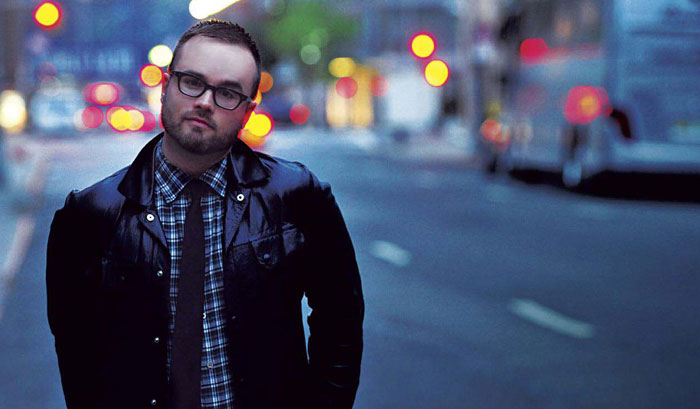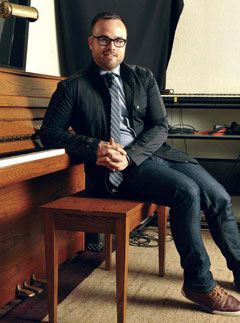


MANY A CURRENT MUSICIAN HAS PLUNDERED his or her parents' record collection, finding inspiration in the warm vocals and soulful grooves of Stevie Wonder, Carole King, and Marvin Gaye. But it takes a special talent to transform those influences into something new.
For New York-based singer/songwriter Todd Alsup, the childhood discovery of such artists was especially illuminating. "I don't come from a particularly musical family," explains the Detroit native. "Nobody really played an instrument, nobody sang. But music has always been my main means of expressing myself. And I thought those records were the best things I'd ever heard."
Motown and '70s singer/songwriter influences are clearly audible on Todd's recently released eponymous LP, which showcases his tightly constructed arrangements, polished lyrics, and engaging pop vocals. He worked on several tracks with producer Steve Greenberg (Joss Stone, Jonas Brothers) to create an organic, analog-flavored sound. "Steve said, 'We could make a record that sounds very slick, very produced, or we can make an album that sounds like it was produced in 1973,'" Todd recalls. "And I said, 'I'll take 1973!'"
A self-described perfectionist, Todd's songwriting approach owes more to diligent craftsmanship than momentary inspiration. "I'm happiest with my songs when I've taken the time to make sure every phrase is perfect," he says. "I always want to know exactly where I'm going. Words are really important to me, and I don't like to waste space. I want to make sure every line is going to pop, that it's in the right place, so everything builds and leads you back to the chorus."

Alsup often turns to his Yamaha U1 upright piano to create new songs. "I prefer to write on an upright," he says. "They've got a different kind of soul to them. Instruments are such a funny business-each one has its own personality. There's something just a little scrappy, a little earthier about the upright. It just speaks to me more."
Though he also played a Yamaha C3 grand on his new album, Alsup's primary studio keyboard was a CP300 Stage Piano. "We used it as a MIDI keyboard to play samples," he notes. "I love the way it plays-because of the weighted key action, it feels like playing an actual piano. I've tried so many different keyboards, and most of the time it feels like you're playing a toy. But in terms of the size, the action, and the tone you get from those piano samples, the Yamaha CP300 feels like the real thing."
In terms of size, the action, and the tone you get from those piano samples, the Yamaha CP300 feels like the real thing.
He also uses his CP300 for live shows when no acoustic piano is available. "It's the only keyboard I'll tour with, because it feels so substantial," Todd says. "The keys feel like a real piano. And the CP300 piano sounds like a piano, unlike many other keyboards I've tried."
Whether Todd is performing solo, with an acoustic trio, or with a full band, he's ready to change course musically at a moment's notice depending on the mood of the audience. "The set list cannot be set in stone," he says. "You shift it as you see fit. Oftentimes I feel like a bus driver navigating traffic. When I can ride with the flow of what's happening in the room, that's when I know a show is going to be great."
In addition to his career as a performer, Alsup teaches music theory at NYU, and instructs private students in voice, piano and songwriting. "I look at my role as sharing the lessons I've learned as a musician, a performer and a writer," he explains. "I try to pass that information on, and hopefully give my students a 'toolbox' they can use on their own music, whether it's harmony, or rhythm studies, or using the right vocal technique so they don't strain when they sing."
One of Todd's favorite teaching topics is effective songcraft. "I just think it's so fascinating being able to capture something that people can connect with," he reflects. "A universal experience. A universal emotion. A universal situation."
So what makes a great song?
"A great song has a great groove," Todd replies. "A great song has a solid lyrical idea, maybe something that's communicated in a new and different way. A truly exciting song can surprise you." He laughs. "Groove, idea and surprises. Fit all that into the concise structure of a pop song, and you've got something really exciting."
(Photography Credit: Rob Shanahan)
























